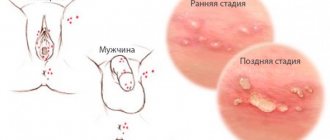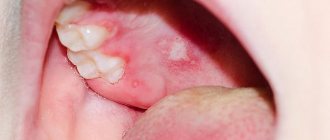Many people are familiar with the unpleasant manifestations of herpes. This is not surprising, because according to WHO, more than 78% of the world's population is infected with the most common types of the virus: 67% are infected with herpes simplex virus type 1, and another 11% with herpes simplex virus type 2.
What is herpes, what causes it, why is it dangerous, and how should it be treated? Having knowledge about the disease, you can minimize the risk of its exacerbation, and most importantly, avoid complications.
Herpes on the lips
Herpes is a virus
The source of the disease is the so-called herpes viruses. These are DNA-containing microorganisms that are causative agents of various types of infections.
The initial entry of the virus into the body usually occurs through the mucous membranes (although entry through damaged skin is not excluded). Having overcome tissue barriers, harmful microorganisms enter the blood and lymph and spread throughout the body. They are able to penetrate the cells of internal organs and nerve endings. The peculiarity and danger of herpes is that it is genetically introduced into the nucleus of nerve cells, after which it remains in the body forever.
Many people do not even realize that they are carriers of the virus, since the pathology in most cases is asymptomatic, not showing itself in any way (this is called a latent state).
The human immune system is capable of suppressing the development of the virus, but if it is weakened, the infection “awakens.”
Herpes Virus
Effect of pregnancy on virus incubation
Often, women who are in the period of bearing a child ask their attending physicians about how the incubation of herpes changes during pregnancy.
It is quite difficult to predict changes in this case.
On the one hand, the body does everything to protect the woman herself, as well as her unborn baby, from negative external influences, including viral particles.
On the other hand, pregnancy is a condition of a woman’s body, accompanied by severe immunosuppression.
Otherwise, bearing a fetus would simply be impossible.
Often it is immunosuppression that prevails in the female body.
As a result, the length of time it takes herpes from entering the body to developing symptoms is significantly shortened. It is also worth considering that herpes is quite capable of penetrating the placenta, leading to infection of the child.
Sometimes it leads to the development of congenital pathologies of varying severity.
Symptoms of different types of herpes
A “sleeping” virus may not bother its host for years. But if for some reason the virus enters the active phase, it is easy to recognize - by its characteristic rashes. The “classic” visual sign of herpes is itchy, watery blisters that can appear in different places - on the face and on the body.
There are several types of herpes virus - they differ in their manifestations. Most often in medical practice, diagnoses such as HSV-1 and HSV-2 are encountered - this is the abbreviated name for herpes simplex viruses types 1 and 2.
Cold sores and chicken pox are related diseases caused by herpes. Several types of the virus can “coexist” in one person.
| Many people call this pathology a “cold on the lips,” although the “classic” cold and herpes are different things. We are talking about the herpes simplex virus type 1, which usually “attacks” the lips and nasolabial triangle. Externally, the disease manifests itself in the form of rashes. They represent one or a whole cluster of bubbles with liquid contents. When asked whether there can be a fever with herpes, the answer is positive: many patients complain of fever, headaches and general weakness. Among doctors, there is another name for pathology: when you see a diagnosis such as oral or labial herpes in your medical record, know that we are talking about the herpes simplex virus type 1. Herpes on the lip is usually very itchy |
| The second type of herpes simplex is accompanied by the development of genital (genital) infections. The disease in most cases is asymptomatic or, as with labial herpes, is accompanied by the appearance of blisters (ulcers), but only in the area of the external genitalia. Other signs of HSV-2 are fever, body aches, fatigue, and swollen lymph nodes in the genitals. Most often, the disease is transmitted sexually, but infection can also occur from a person with labial herpes. |
| Virus type 3, also known as the herpes zoster virus, is the culprit of chickenpox. To become infected, it is enough to enter into a conversation with a sick person (transmission occurs through airborne droplets). Having had chickenpox, a person remains a carrier of this virus for the rest of his life. In case of relapse, there is a risk of developing herpes zoster. This disease is characterized by the appearance of itchy rashes throughout the body, as well as fever. Chicken pox |
| Herpes type 4 causes such a serious infectious disease as mononucleosis. This disease is accompanied by enlarged lymph nodes and fever; the patient complains of a sore throat and general weakness. The liver and spleen are also affected. |
| Herpes type 5 provokes the development of cytomegalovirus. The disease manifests itself differently, depending on which organ is affected. A runny nose, disturbances in the gastrointestinal tract, inflammatory diseases of the genital organs - all this can be a sign of pathology. |
| In addition to those described above, there are also types 6, 7 and 8 herpes. Scientists are now studying these viruses. |
The influence of HIV infection on the incubation period of herpes
Another common question is how the duration of incubation changes during HIV infection.
There is nothing surprising in such a question.
After all, the human immunodeficiency virus is becoming increasingly common in medical practice today.
Much in this case depends on how strongly the patient’s immunity is suppressed.
For example, if a patient regularly takes HIV medications and his lymphocyte levels remain normal, the incubation period may remain within the standard range.
If the patient ignores the doctor’s recommendations and refuses medications, the level of his defense system drops to catastrophic levels.
The result is predictable: the period of time is greatly shortened.
The disease makes itself felt much earlier than if HIV were controlled or completely absent from the body.
Herpes - what causes it?
The risk of contracting an infection arises from a very early age, because there are a huge number of adults around a small child, most of whom are carriers of herpes. Infection can also occur in the womb of an infected mother.
So, what can cause herpes on the lips? Children (and adults) often become infected through kissing, as well as through sharing utensils. If you are near a person with herpes who coughs or sneezes, there is a high risk of infection through airborne droplets. In addition, the virus is transmitted sexually (primarily this concerns HSV-2). People who receive blood transfusions are also at risk.
Fortunately, most people infected with the herpes virus (about 80%) have an inactive form of the infection. However, there are factors that provoke a relapse - then the “sleeping” virus begins to actively multiply. So, some people regularly suffer from sores on their lips - the hated “cold” can appear 5-10 times a year. The cause of recurrence of the disease may be:
- diseases – endocrine, viral and bacterial;
- hypothermia;
- stress;
- exhaustion of the body;
- overwork;
- injuries;
- metabolic disorders.
In women, another provoking factor is menstruation.
Herpes and pregnancy.
Lip herpes during pregnancy is not dangerous to the fetus and is not an indication for termination of pregnancy. A woman who has experienced an exacerbation of herpes lips during pregnancy produces antibodies that protect the unborn baby.
Only primary infection is dangerous. In this case, the herpes virus can cause termination of pregnancy and the formation of deformities in the fetus.
Genital herpes, if an exacerbation occurs before childbirth, is an indication for cesarean section, since infection of a newborn with herpes is very dangerous for him. In newborns, herpes takes on severe, generalized forms and can even lead to death. Therefore, be attentive to yourself and your unborn child, go through all the studies and procedures that the doctor will prescribe for you. Genital herpes often causes miscarriage or premature birth.
Is there any prevention against herpes?
To resist the virus, you need a strong immune system. Therefore, those who suffer from frequent colds on the lips need to pay attention to their immune system. Take care of a healthy, balanced diet, do not forget about sports, maintain a normal daily schedule (first of all, ensure that you get adequate sleep) and try to get rid of bad habits (smoking, etc.).
It is important to practice basic hygiene, including regular hand washing. It is recommended to use personal hygiene products. During infectious epidemics, it is advisable to avoid staying in crowded places if possible.
To reduce the risk of genital herpes, you should use condoms.
Features of preventing herpes after infection
Patients who think they are in the incubation period will certainly ask the doctor a question.
What to do to ensure that the disease does not develop fully, but remains in a dormant state.
There really aren't many options.
Firstly, the effectiveness of prevention with Valvir and Valtrex has been proven.
These drugs are taken orally in tablet form and can inhibit the activity of viral particles.
The main thing is to take them according to the doctor-recommended regimen.
However, herpes is a virus that cannot be gotten rid of once and for all.
Today such drugs simply do not exist.
Therefore, for example, the PCR reaction may remain positive during diagnostic examinations.
Doctors additionally note that you should not rely only on medications.
Measures must be taken to increase the overall level of immunity.
To do this, they use immunostimulants, lead a healthy lifestyle, follow a light diet, and engage in physical activity.
How to find out if there is a virus?
Already during the initial examination of the patient, the doctor can determine the presence of herpes (often people who have visual manifestations of the disease seek medical help). But in order to confirm the diagnosis and determine the degree of development of the infection, laboratory tests are prescribed.
Tests are important when planning pregnancy, since the virus is dangerous to the fetus. Tests are also required for patients preparing for transplantation.
There are several diagnostic methods - which one will be optimal in a particular case, the doctor will tell you. The presence of the herpes virus and its type can be determined by blood tests (enzyme immunoassay, PCR analysis, immunofluorescence reaction) and scrapings (culture method, immunofluorescence reaction). The most accurate, but also the most time-consuming and expensive method is the cultural method, which involves “growing” a virus obtained from a patient’s biomaterial in laboratory conditions.
Diagnosis of herpes
How does herpes simplex develop?
- It all starts with itching and/or tingling in the place where herpes develops - as we have already found out, most often this is the area of the nasolabial triangle. The skin turns red and begins to itch.
- Next, the stage of inflammation begins. Swelling appears in the affected area and a small, painful pimple appears - a blister containing clear liquid. Over time, this liquid becomes cloudy. A small pimple(s) gradually increases in size.
- The blisters burst 3–5 days after the onset of the disease. A liquid flows from them, containing an uncountable number of viral particles. During this period, contact with a sick person should be stopped, since the risk of infection is very high. At the site of the rash, ulcers with a purulent crust (scabs) form. When the scab is damaged, bleeding begins.
A natural question for every patient is, how many days does it take for herpes to go away? This usually takes about 10 days. If symptoms do not disappear during this time, you should see a doctor, since herpes can signal the presence of other diseases.
Herpes ointment
What to do if herpes incubation takes a very long time
Doctors have long noticed that not all patients develop herpes according to the standard pattern.
This fact further complicates treatment during the incubation period.
It is worth keeping in mind: if the patient has a strong body, an active immune system, symptoms of the disease may not appear for a very, very long time.
Do you need to worry if there are no symptoms of the disease, although they should be, since infection has definitely occurred?
Until rashes begin to appear, the patient can be calm about his health.
Herpes is not an infection that undermines the body unnoticed.
Its symptoms are quite vivid and difficult to ignore.
If there are no symptoms, then the virus is dormant and does not pose a threat to the body.
Since it is completely impossible to remove a pathogenic microorganism from the body, all that remains is to make efforts to prevent it from becoming more active.
Possible complications
The herpes virus should not be perceived as an unpleasant but harmless “sore.” This is a rather insidious disease that poses a particular danger to pregnant women, infants and people with weakened immune systems (patients with cancer, people with HIV and AIDS).
The virus is not limited to superficial tissues - it easily penetrates into internal ones. The main targets of herpes are the mucous membranes, skin, eyes (conjunctivitis can also be a consequence of herpes), as well as the central nervous system and brain. Lymph nodes and internal organs can be affected by the virus. Due to the fault of the pathogenic microorganism, the functioning of the liver, lungs, intestines and kidneys can be disrupted.
The consequences of herpes can be stomatitis, infertility, miscarriage, congenital deformities in children, encephalitis, inflammation in the joints, prostatitis, benign and malignant tumors. Scientists, based on research, associate the development of multiple sclerosis and Alzheimer's disease with herpes.
If a person’s immune system is weakened, other infections, both viral and bacterial, can “join” herpes, and this, in turn, puts an increased burden on the heart.
Can a cold from hypothermia be contagious?
It would seem that if a person gets sick due to hypothermia, then he does not pose a threat to others, even if he “suffers a cold on his feet.” But this is a wrong point of view. If a person is sick, viruses have already begun to actively multiply in his body. This means that “mild influenza” can lead to serious complications. The disease, as we know, is easier to prevent than to cure, so antiviral drugs are often prescribed in the complex treatment of colds. For example, for prevention you can use VIFERON Gel, applying it to the nasal mucosa three to four times a day, and if a viral infection is diagnosed, then in this case you can use VIFERON suppositories, which is not only an antiviral, but an immunomodulatory drug. It is indicated even for pregnant women from the 14th week of gestation and newborns.
Which doctor's help might be needed for herpes?
With the questions “what causes herpes to constantly appear on the lips” and “I’m tormented by herpes - what to do?” You can contact your therapist first. He will subsequently refer you to an infectious disease specialist or dermatologist (if we are talking about an oral virus). Patients with a genital infection should see a gynecologist (women) or a urologist (men). Since the pathology may be associated with diseases of the internal organs, you may need to consult a gastroenterologist, hepatologist or pulmonologist.
How to treat herpes?
It is impossible to completely destroy a virus that has entered the body. But it is quite possible to suppress its activity so much that it does not bother you. In modern medicine, an integrated approach is used for this. The best results are obtained by combination therapy, which involves the use of antiviral drugs (they are available in the form of drugs for internal use and in the form of external agents), as well as drugs that strengthen the immune system. In some cases, the patient is additionally prescribed local analgesics and physiotherapeutic procedures.
Many people are interested in whether it is possible to burn herpes with alcohol? Alas, this method does not affect the virus, but only damages the mucous membranes, so it is better to use special ointments.
What remedies are usually prescribed for herpes on the lips? The table shows a list of the most common medications used to treat the virus.
| Name, dosage form | Description |
| Acyclovir (aka Zovirax). Available in the form of tablets, cream, eye ointments, injection solutions. | An inexpensive antiviral drug that stops the replication of the virus. Addressed to adults and children over 3 years old. Not recommended for use during pregnancy. Antiviral ointment |
| Valacyclovir (aka Valtrex) Available in the form of 500 mg tablets. | One of the best drugs for herpes. It differs from Acyclovir in the method of delivery of the active ingredient. Suppresses the activity of the virus and reduces symptoms. When taking the drug, the risk of infection through contact with other people is reduced. Treatment of herpes in 3 days |
| Famciclovir (aka Famvir) Available in the form of tablets 125, 250 and 500 mg. | Just like Acyclovir and Valtrex, it blocks the replication of the virus. Helps in the treatment of simple virus and the virus that causes chickenpox. Famciclovir is effective against viruses resistant to Acyclovir. Famciclovir |
| Panavir Available in the form of a solution for intravenous injection, as well as in the form of a gel and suppositories (suppositories). | Antiviral, anti-inflammatory and immunomodulatory drug of plant origin. Increases the body's resistance to infections and has an antipyretic effect. |
| Docosanol (aka Erazaban) Available in the form of a cream for external use. | Has an antiviral effect. Intended for use in adults and children over 12 years of age. Pregnant women are prescribed with caution. |
| Proteflazid Available in the form of drops. | Antiviral agent for systemic use. Intended for the treatment of herpes simplex in children and adults. Used in pediatric practice (including in children under 1 year). |
| Flavoside Available in the form of syrup. | Effective in the treatment of herpes simplex, as well as in the treatment and prevention of influenza. Used in pediatric practice (including in children under 1 year). |
The presented list of drugs is far from complete - the doctor, depending on the characteristics of a particular patient, may recommend other drugs. For example, in some cases antibiotics cannot be avoided (if there is a risk of contracting other infections).
Herpes and personal life.
Herpes does not in any way affect a person’s life expectancy, but it causes him suffering: physical and moral. An exacerbation can reduce performance, even provoke depression. Unfortunately, herpes is incurable. For some it worsens more often, for others less often: it all depends on the state of a person’s immunity. But with proper treatment prescribed by a gynecologist, there is a high probability that the disease will recur much less frequently.
Genital herpes negatively affects your personal life. The patient is tormented by thoughts that he could infect his partner. He is haunted by fears of being abandoned, abandoned. Doctors recommend not having sexual intercourse during an exacerbation and using modern antiviral drugs - then the risk of infecting a healthy partner is significantly reduced.










